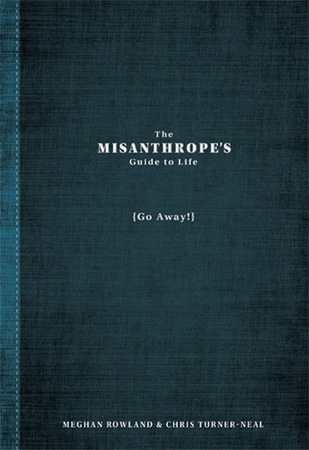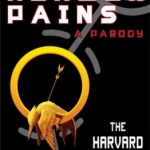
Title: The Misanthrope’s Guide to Life (Go Away!)
Writer: Meghan Rowland and Chris Turner-Neal
Publisher: Adams Media
Release Date: September 18, 2011
Before reading this book, I thought of myself as a misanthrope. Shopping, for example, always finds me grumbling under my breath at the idiots who park their carts in the middle of the aisle then stand there for ten minutes trying to decide whether to buy the store brand of cereal of the name brand that’s on sale. And don’t get me started on the abuses of the “express” lane.
After reading this book, however, I’ve come to realize that perhaps I’m not nearly as misanthropic as I’d thought. The situations described as driving most misanthropes crazy don’t really bother me. Of course, they are exaggerated for comic effect in this book. I’m fairly certain that no one but the most extreme misanthrope would smoke cigarettes in front of a class of children just to get out of being the homeroom mom. And offering them to the kids takes it just that one step further.
That’s what makes this book so enjoyable. It takes fairly normal situations and exaggerates them to become horror stories, then gives advice on how to deal with them, again in an exaggerated manner. A few more examples will serve to illustrate the point: in order to stop someone from talking loudly on a cell phone, one suggestion would be to urinate on their phone. Or how about getting married at an anime convention as a way to avoid having people actually show up at your wedding (the assumption being that they won’t want to dress up — of course that wouldn’t work if your friends are as geeky as mine!)? Then there’s advice for what to do in a hostage situation while vacationing: “Pretend to be mute and only able to read Finnish.” That’s pretty extreme!
I also found a few quotable gems that are worth mentioning. The first is “Irony is the whip of a sarcastic God.” A sarcastic God is a god that I might actually be tempted to believe in. There’s also this from the section on using Wikipedia to avoid talking to people to get information: “A pound of avoidance is worth an ounce of inaccuracy.” As someone who avoids people as much as possible, that’s an idea I can get behind. I also liked this fortune cookie fortune for misanthropes: “Privacy is the stripes on the tiger of solitude.” Quasi-Asian and also true!
I only have a couple of criticisms of the book. The first is not necessarily about the book itself, but about non-fiction, particularly comedic non-fiction, in general. There’s a bit too much repetition of the same idea, just with the situation changed. This book has sections on friendship, travel, parenting, love, holidays, and more. After a couple of chapters it does get a bit repetitive. I realize that the idea is to drive the point home with lots of examples, but sometimes it can get wearing. Fortunately, putting the book down and coming back to it can easily solve that potential problem. The second criticism is that sometimes the examples were a bit too gender specific. Much of the chapter on being a parent, for example, is from the mother’s perspective. There are also examples that are specifically male. For a guide that purports to be for all misanthropes, this can pull the reader out of the book. Neither of these criticisms ruined the book, but I did feel them worth mentioning.
I’ll end with a quote from somewhere near the middle of the book in the travel section: “If you take one thing away from this book, let it be this: Misanthropes hate doing something if there’s no apparent reason for it.” This pretty well sums up the philosophy of the book. If you feel the same, you’ll enjoy this book.
Rating: 3.5 / 5






